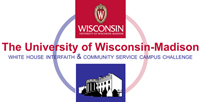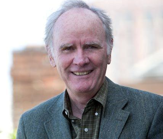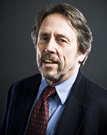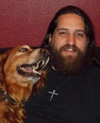

Vol 2, Issue 1 • Fall 2011
Accepting the Interfaith Challenge
Upcoming LISAR programs include White House initiative, Thering Fellow
 LISAR is spearheading UW-Madison’s response to the White House Interfaith & Community Service Campus Challenge. Charles Cohen, the Institute’s Director, is UW’s lead contact.
LISAR is spearheading UW-Madison’s response to the White House Interfaith & Community Service Campus Challenge. Charles Cohen, the Institute’s Director, is UW’s lead contact.
Designed to make interfaith cooperation a higher priority for the nation’s institutions of higher education and to stimulate that cooperation by enlisting students from different (or no) religious backgrounds into a variety of projects, the Challenge is the brainchild of Eboo Patel, founder of the Interfaith Youth Core (IFYC) and a member of the President’s Council on Faith-Based and Neighborhood Partnerships. In August 2010 Professor Cohen participated in the IFYC conference that helped develop the proposal and that President Obama himself eventually ratified.
The year-long program kicked off on August 3, when representatives of some 300 schools visited the White House to receive encouragement and share ideas. Rohany Nayan, LISAR’s Graduate Fellow, and Nancy Mathews, Director of the Morgridge Center for Public Service, served as UW’s delegation, one of the very few from a public institution.
UW’s response includes more than a dozen different activities that will engage thousands of students, faculty and staff throughout 2011-12. For the most up-to-date information, go to the dedicated website: lisar.lss.wisc.edu/whitehouse
![]()
 This October the Institute welcomes James Carroll, distinguished author and columnist for the Boston Globe, as LISAR’s fourth annual Rose Thering Fellow.
This October the Institute welcomes James Carroll, distinguished author and columnist for the Boston Globe, as LISAR’s fourth annual Rose Thering Fellow.
Carroll has published ten novels and six works of non-fiction, including the National Book Award-winning An American Requiem; the bestselling Constantine’s Sword; and, most recently, Jerusalem, Jerusalem: How the Ancient City Ignited Our Modern World.
Joined by UW alum Judith Banki, Director of Special Programs at the Tanenbaum Center for Interreligious Understanding, Carroll will hold conversations with faculty, students and the community as well as deliver the public lecture, “Jews, Christians, Muslims: The Better Future,” on Tuesday, October 18, at 7:30 PM in the Fluno Center.
![]()
 Several years ago I received an email from Paul Joyce, Head of the Faculty of Theology at Oxford University, announcing the creation of a newly donated chair in Abrahamic religion and asking me for recommendations.
Several years ago I received an email from Paul Joyce, Head of the Faculty of Theology at Oxford University, announcing the creation of a newly donated chair in Abrahamic religion and asking me for recommendations.
As our exchanges progressed, I suggested that LISAR and Oxford collaborate on a series of conferences. That ambition has now been realized. Oxford hired Professor Guy Stroumsa for the position, and, on July 26-28, he and I convened the first of what we hope will be a series of academic meetings dedicated to assessing the state of “Abrahamic Studies” at the beginning of the twenty-first century. The first conference, “Tradition and Its Discontents: Ruptures in the Abrahamic Religions,” brought together panelists from Egypt, Morocco, Tunisia and Israel as well as Britain and the United States.
The papers ranged from close investigations of writings from the different religion to a comparison of “popular religion” in medieval Islam and Judaism. Going back to an old love, I argued for problematizing the notion of rupture between tradition and modernity, citing Puritanism’s capacity to look forward and backward simultaneously, while Ulrich Rosenhagen spoke about Protestantism’s important contribution to the American Revolution. The Conference may have reached no definitive conclusion—academic conclaves seldom do—but its greater importance lay in the engagement of scholars from such different fields, locations, and religious perspectives. The whole was truly greater than the sum of its parts.
The conference pioneered not only cooperation between a six-year-old institute at UW-Madison and a nine-hundred-year-old university, but also the recognition that the relationships between Judaism, Christianity and Islam constitute a coherent field of study with both academic and practical ramifications. Indeed, Cambridge University has just initiated its own search for an Abrahamic scholar. Recognition of the field by the two pillars of British higher education would seem to indicate that close comparative study of the Abrahamic religions is an idea whose time has come. LISAR has pushed this point since our founding, and I am pleased to see it gain traction in the highest intellectual spheres. The LISAR staff look forward to hosting the second joint conference, on politics and political theology, in Madison in 2012, with an equally international cast.
![]()
LISAR
Fellows
Voice
Joseph O'Donnell,
LISAR Fellow, 2011-12
 Despite being raised in a religious family, my late childhood and early adult years were plagued with a doubt about the existence of God. I was in my late twenties when a revelation changed my perspective. From that moment, I wanted to know, understand, and connect with God and that desire expanded like ripples from a pebble in a vast ocean.
Despite being raised in a religious family, my late childhood and early adult years were plagued with a doubt about the existence of God. I was in my late twenties when a revelation changed my perspective. From that moment, I wanted to know, understand, and connect with God and that desire expanded like ripples from a pebble in a vast ocean.
For the last three years, I have been on an eight-year path that hopefully leads to serving as an ordained pastor and a Chaplain for the United States Armed Forces. When I felt the call to this path, I learned about the education requirements. While looking into the present-day military, I learned there was a great need for chaplains of all faiths.
I decided that to best serve those men and women, I needed to diversify my education and understanding of faith and not limit myself to a Christian perspective. Because of this, I have directed my studies toward Judaism, Islam, and the languages of scripture.
Late in the last year, I had the opportunity to participate in the Lubar Institute for the Study of the Abrahamic Religions (LISAR) forum, and saw incredible potential in the hands of those who could keep and express their faith without turning to anger or conflict in the face of some of the most contentious topics.
In LISAR, I see the chance to enjoy more of that marvelous experience, and to expand my interfaith experience in order to become a better servant to others and to God.
![]()
 This fall is a busy time at the UW-Madison---classes are back in swing, students are getting involved in campus activities and LISAR is spearheading the President’s Interfaith and Community Service Campus. Now, more than ever your gift can make a meaningful difference!
This fall is a busy time at the UW-Madison---classes are back in swing, students are getting involved in campus activities and LISAR is spearheading the President’s Interfaith and Community Service Campus. Now, more than ever your gift can make a meaningful difference!
All contributions to the Institute offer the opportunity to participate in an unparalled effort: the bringing together of Muslim, Jewish and Christian students, faculty and community members to share ideas, learn about other faiths and increase understanding of their own. Even the smallest gift enables LISAR to do something we could not otherwise accomplish. You may wish to visit our Web site to examine some examples of what levels of donation may do, but the real list of giving opportunities is endless.
The campaign for LISAR, like the Institute itself, is unique; it could happen only at a public institution with a long tradition of civic involvement like UW- Madison. We invite you to become a part of this unprecedented enterprise. You can easily make an online donation to the Lubar Institute via secure server, or you can make a gift by mail by contacting our UW Foundation representative:
Stephen Wald, Director of Development
College of Letters and Science
University of Wisconsin Foundation
608-263-2202 (office) 608-287-6480 (cell)
stephen.wald@supportuw.org
